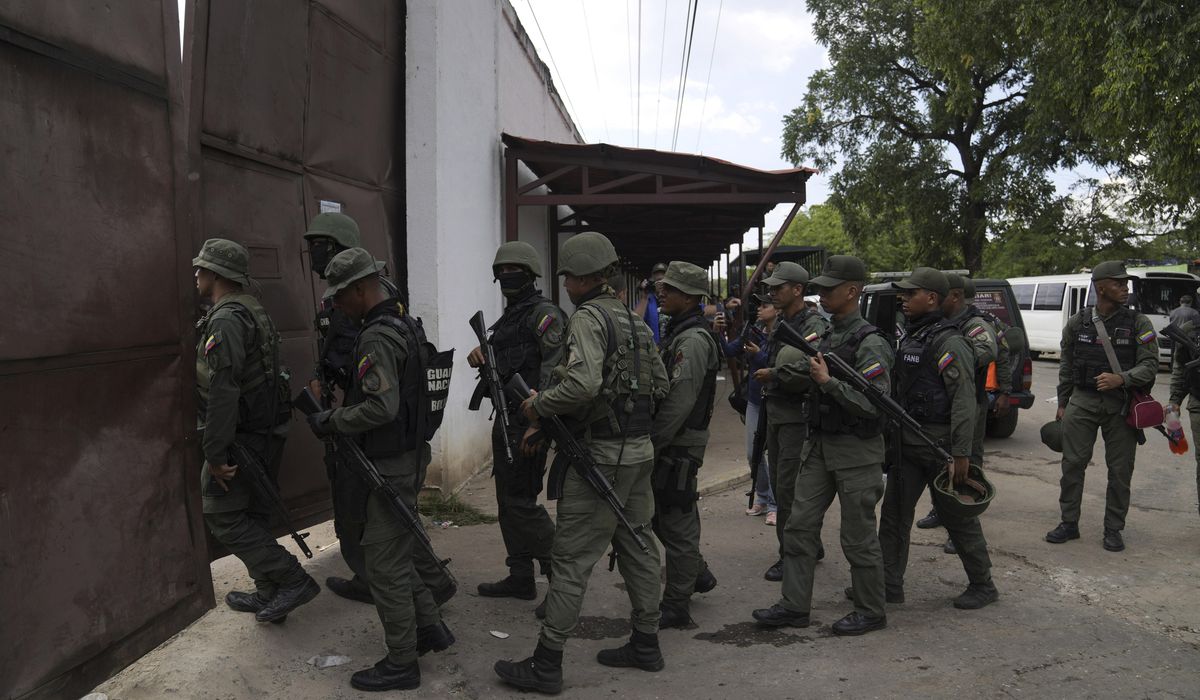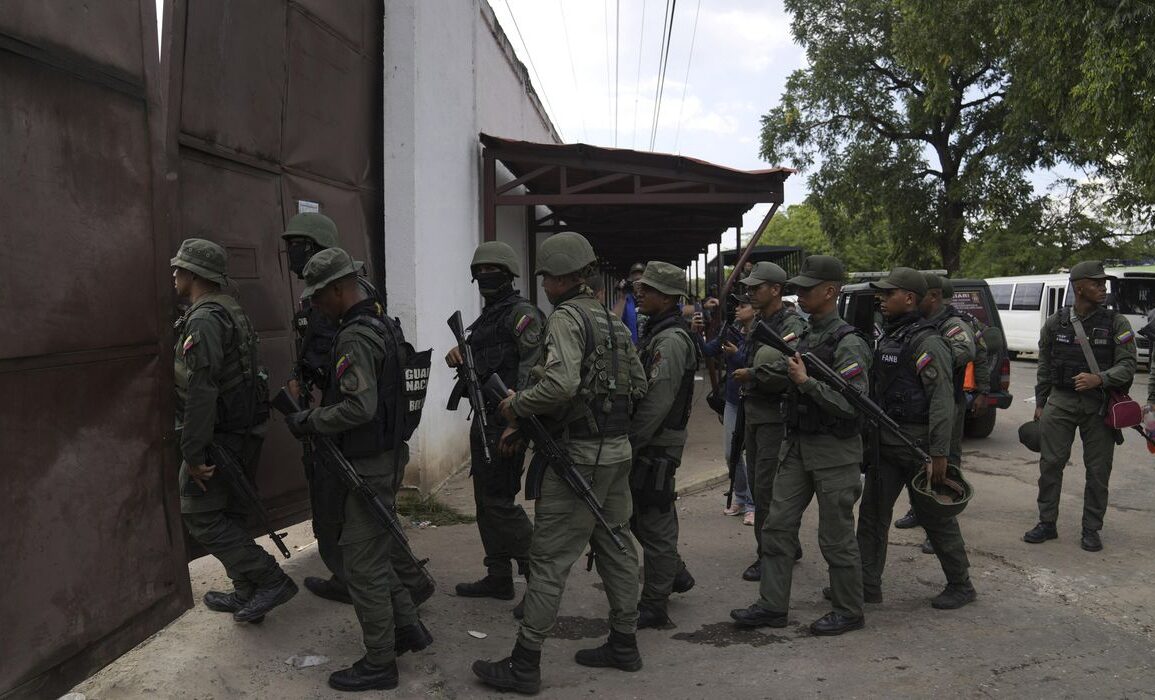
Two cops shot in New York City. A jogger beaten to death in Georgia. A Texas hotel taken over by armed criminals.
The common thread in a sprawling nationwide web of violence, according to law enforcement officials, is a ruthless Venezuelan prison gang exporting its drug-weapon-human-trafficking operations north to American cities.
But the gang’s leaders have largely eluded any effort to bring them to justice in the U.S., according to analysts who have studied Tren de Aragua, or TDA, as the gang is commonly known.
TDA’s secretive hierarchy has helped its crime bosses stay steps ahead of U.S. authorities, said Gregg Etter, a University of Central Missouri criminologist who has written extensively about the gang.
More than 150 TDA members have been arrested at the border, and dozens more inside the U.S., the past two years. But thanks to the group’s decentralized chain of command, police are mainly capturing low-level gang members, Mr. Etter told The Washington Times.
“When the FBI was taking down the Mafia … or one of the big motorcycle gangs, they’ll go all up and down the structure, horizontally and vertically, and then they’ll take down the whole group at once,” Mr. Etter said. “That’s kind of hard to do if you don’t have a command structure.”
Mr. Etter, a regular contributor to the Journal of Gang Research, said TDA operates in small bands designed to protect the decision-makers who supply the gang’s American outposts with high-powered weapons and criminal contacts.
The group’s franchise-style approach to bullying its way into new American crime markets has left authorities struggling to identify the leadership behind the mayhem.
But several recent high-profile incidents have put TDA on the radar for local, state and federal officials — and made the gang part of the national debate in this year’s presidential contest over out-of-control crime.
‘Liberate Aurora’
The new focus on TDA and its activities intensified this year after a video went viral of a pack of gun-toting gangsters going door-to-door in an Aurora, Colorado, apartment complex. The apartments were in one of three buildings that local officials quietly acknowledged were seized by the gang.
The surveillance footage prompted former President Donald Trump to say during last month’s presidential debate that Tren de Aragua was “taking over” the city. He followed up on that point days later by saying he would “liberate Aurora” with federal muscle.
City leaders said concerns were overblown. New Police Chief Todd Chamberlain recently said the “hysteria” was not “valid,” and his comments were quickly echoed by the Denver suburb’s top politician.
“TDA has not ’taken over’ the city,” Mayor Mike Coffman, a Republican, said in a joint statement with Councilwoman Danielle Jurinsky, chair of the council’s public safety committee. “The overstated claims fueled by social media and through select news organizations are simply not true.”
Aurora police did say they are investigating 10 people for suspected ties to the criminal group.
But while officials in Colorado pushed back on the suggestion that the city is overrun by the TDA, it’s clear the Venezuelan gang is expanding its reach into the U.S.
Border Patrol Chief Jason Owens recently said 70 members of the gang were arrested along the U.S.-Mexico line as of mid-September.
The Texas Department of Public Safety said more than 100 TDA members also were apprehended in March on rioting charges at the border.
Gov. Greg Abbott, a Republican, announced last month that he’s dropping the hammer on the insurgent criminal organization by declaring it a foreign terrorist group. That will give the state power to put them behind bars for longer and seize their property through civil forfeiture.
“Tren de Aragua has spread terror and carnage in every country they’ve been in, and Texas will not allow them to gain a foothold in our state,” Mr. Abbott said in a statement. “Texas will not let these thugs use our state as a base of operations to terrorize our citizens.”
And local authorities in the Lone Star State have been busy handcuffing gang members.
San Antonio police said they arrested multiple gang members over the weekend while sweeping a vacant apartment building for human trafficking concerns.
Four TDA members were taken into custody, and 15 other people were arrested as well.
Department of Public Safety officials said police nabbed more than 20 of the gangsters after they were accused of running a human smuggling and prostitution operation out of the Gateway Hotel in downtown El Paso.
And federal Department of Homeland Security officials teamed up with San Antonio police to arrest two suspected gang members after linking the pair to TDA’s gun-trafficking operation.
Open season on cops
A willingness to fight the law — occasionally with lethal force — has been a hallmark of TDA’s time in the U.S.
Tren de Aragua members were accused in January of jumping two New York City police officers near Times Square.
And in June, a 19-year-old TDA member was charged with shooting two officers in Queens. Court documents said the suspect was nonplussed by the violence against law enforcement because it was “common practice” to open fire on police in Venezuela.
TDA also gave its members the green light to shoot at Colorado police this summer, according to Homeland Security officials.
TDA hasn’t been shy about making its presence known to police or to local American gangs, such as those on Chicago’s South Side.
The Venezuelan mobsters will wear their uniform — which includes Chicago Bulls gear — and have had run-ins with longtime criminal groups such as the Gangster Disciples and Vice Lords, according to the New York Post.
A Black P. Stone gangster told the newspaper that some TDA members flash their guns at local gangs.
“When the Black gangs here get fed up with the illegalities and criminal activities of these migrants or noncitizens, the city of Chicago is going to go up in flames and there will be nothing the National Guard or the government can do about it when the bloodshed hits the streets. It’ll be Blacks against migrants,” Tyrone Muhammad, a former gangster-turned-violence interrupter, told the Post.
The brutality of individual Tren de Aragua members and associates has shocked the public.
In February, police accused a man linked to TDA of attacking Georgia nursing student Laken Riley when he yanked the jogger off a dirt trail and beat her to death.
Suspect Jose Ibarra, 26, is set to go to trial in November over the crime.
Two Venezuelan migrants charged in the June strangling of 12-year-old Jocelyn Nungaray are suspected of having ties to TDA.
Houston NBC affiliate KPRC-TV reported that Johan Jose Rangel Martinez, 21, and Franklin Jose Pena Ramos, 26, are having their tattoos and their activity on TikTok investigated for possible links to the gang.
Both men, who entered the U.S. illegally, are being held in jail on capital murder charges.
And last year, two gang members were charged with killing a former Venezuelan police officer in South Florida.
Court documents said the victim was lured to a Miami hotel to meet a woman, then was tied up by two TDA members and strangled.
Both suspects — Julio Cesar Hernandez-Montero, 27, and Yurwin Salazar-Maita, 23 — could be sentenced to death if found guilty.
Kingpin in hiding
Still, TDA’s head honchos remain largely a mystery to U.S. law enforcement.
In July, the U.S. offered a $5 million bounty for the arrest of TDA leader Hector Guerrero Flores, better known as El Nino Guerrero.
The crime boss has been the subject of an international manhunt. But basic information, such as his recent whereabouts, an up-to-date photo or even an estimate of his height, is left out of the advisory. The Associated Press reported he’s believed to be hiding out in Colombia.
Guerrero may be keeping a low profile, but his fingerprints are all over the human trafficking at the U.S. southern border.
The gang infiltrated America by crossing that porous boundary, according to Gov. Abbott.
Since arriving, TDA has expanded its criminal enterprises to include murder-for-hire plots, kidnappings and moped-riding smash-and-grabs or muggings.
Mr. Etter said the TDA members offer what amount to “guided tours” from South America all the way into the U.S. — smuggling journeys that have become one of their bigger moneymakers, thanks to the de facto open border.
He suggested the gang is likely working alongside the Mexican cartels, or at least paying a pass-through tax so it can continue human smuggling operations uninterrupted.
“They identified there’s money to be made in immigration and they’ve taken advantage of that business,” Ronna Risquez, a Venezuelan journalist who wrote a book about Tren de Aragua, told The New York Times.
The Mexican government, Mr. Etter added, has no interest in confronting a criminal group known for burying victims alive and warring with the Salvadoran MS-13 gang.
Mr. Etter said some of the street-level operations are run by lieutenants, or luceros, as they are known by the TDA. Catching any of the gang’s most influential leaders has proved difficult.
Mr. Etter said an additional challenge is that Tren de Aragua operations in each city are small franchises of the broader gang conglomerate.
They never move in packs of more than 20 members, so if the law rounds them up, they can cut their losses without jeopardizing a chain reaction to TDA’s higher-ups.
Further, Mr. Etter said the gang lacks the unwritten code that often governs conduct in other criminal organizations, such as the Hells Angels and the Italian mob.
He said their only real principle is for the members to adapt to their surroundings and start making money, much of which goes back to Venezuela.
The growth of Tren de Aragua has law enforcement across the country racing to catch up to their evolving tactics.
“It’s an incredibly ambitious gang,” Mr. Etter said. “And an incredibly vicious gang.”
This post was originally published on this site be sure to check out more of their content.









